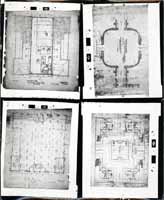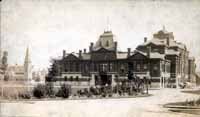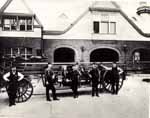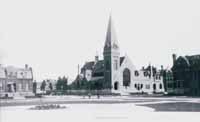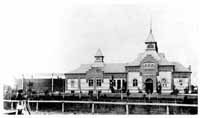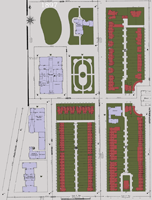The Pullman Library
You are at Home -> The Town of Pullman -> The Arcade -> The Pullman BankThe Pullman Library
Contributed by Kate Corcoran
Almost a year after the opening of the Arcade, the Pullman Public Library was officially dedicated, on April 11, 1883. For the event, a special train ran from Chicago to Pullman, where the ceremonies were held in the theater. Although George Pullman was present, the dedicatory address was read by Professor David Swing, a liberal pastor of Central Church in Chicago and friend of George Pullman. He first read Pullman's document conveying the gift: I, George M. Pullman, of Chicago, Cook County, Ill., in consideration of the fact that the moral and intellectual growth of any community promotes and advances not only all of its material interests, but all the forms of human welfare, do hereby give, grant, transfer, and set over unto the Pullman Public Library, a corporation created and existing under and by virtue of the Laws of the State of Illinois, the following named books, publications, and periodicals...To have and to hold the same unto the said Pullman Public Library and its successors forever. In witness whereof I have hereunto set my hand and seal at Chicago this 10th day of April, A.D. 1883. -- George M. Pullman Swing concluded his remarks: The gentleman who gave these volumes, and who has been the soul of this new alliance between capital and labor, has among the many good works of his life done no one act more useful or attractive than this last act recorded in these many books. I thank him not only in the name of the grateful citizens of Pullman, but in the name of those good and kind beings in the outer circle who love to see the unfolding leaves and blossoms of a better civilization.

Interior of the library |

Interior of the library |

Interior of the library, showing Bertha Ludlam and patron |

Interior of the library, showing Bertha Ludlam |
Tauchnitz Collection
The Tauchnitz Collection of British and American Authors, which formed the basis of 3,000 volumes of the original Pullman Library book collection, was popular in Europe, especially for English-speaking tourists on the continent. As frequent European travelers, the Pullmans would have been familiar with this collection. If one examines with a magnifying glass the above photographs, one can see titles of some of the oversized books, including Art and Artist Illustrated, Historical Poems and Ballads, and Stories from the Old Testament for Children.Bertha Ludlam's Account of the History of the Library
The History of the Pullman Library Extracted from The Calumet Index dated October 12, 1917: Story Pullman Library Full of Local Romance Interesting Article Written by Bertha Stewart Ludlam, Librarian, for The Calumet Index, Gives Early History FEW KNOW REAL STORY Details How the Library Came to Be, Where the Maintenance Source Comes From, and What Keeps it Going are Given Herein. One of the most interesting places in this community is the Pullman Free Library, a place where men of distinction and renown have come and spent hours, where the hope and desires of the late George M. Pullman were centered, and where the people of this community may go and find recreation in the reading of fine literature. The ever-changing population of this territory perhaps does not know the real history of this free institution, so The Calumet Index has the pleasure this week to print the first installment of an article by Bertha Stewart Ludlam, the present librarian, dealing with the story from the early life of this place. The article follows: “History of the Pullman Public Library.” Written by Bertha Stewart Ludlam The Pullman Public Library was originally the gift to the Town of Pullman from the late George M. Pullman, founder of the town, and was opened to the public April 10th, 1883. The collection of books at that time numbered five thousand (5,000) volumes, some three thousand (3,000) of which were in the Tauchnitz edition of standard authors. Professor David Swing, of Chicago, made the dedicatory address in the Pullman Theatre May 10th, 1883, to a large audience of representative people gathered there for the occasion from Pullman and the City of Chicago. The exercises were opened by reading from the stage document, signed by Mr. Pullman, making the conveyance of a long list of books, periodicals, etc. (in number 5,000) to the Pullman Public Library as follows: I, George M. Pullman, of Chicago, Cook County, Ill., in consideration of the fact that the moral and intellectual growth of any community promotes and advances not only all of its material interests, but all the forms of human welfare, do hereby give, grant, transfer, and set over unto the Pullman Public Library, a corporation created and existing under and by virtue of the laws of the State of Illinois, the following named books, publications, and periodicals, to wit” (Here comes the list of books [which the newspaper article does not include].) To have and to hold the same, unto the said Pullman Public Library and its successors forever. In witness whereof I have hereunto set my hand and seal, at Chicago, this 10th day of April, A.D., 1883. GEORGE M. PULLMAN After the conclusion of the exercises all present were invited to visit the Library rooms (5 in number) located in the southeast corner of the Arcade Building, where it is still used and enjoyed by all residents of Pullman proper and its immediate vicinity. The Library may be described somewhat as follows: In the main reading rooms are massive ornamental pillars which support the roof and stained glass dome which gives abundant light by day. Artistic open mahogany book cases house and display the books. Three long magazine tables fill the centre of the room, while there are small tables for individual use, comfortable easy chairs, lounges and rugs to be found everywhere. Adjoining the main room are three class rooms which may be used at any time by anyone desiring them, and there is also a good sized filing room for back numbers of magazines, papers, and other reference material. The first Librarian appointed was Mrs. Lucy Hall Fake, an old resident of Chicago, and the entire selection and arrangement of books was left to her judgment, with the assistance of Mr. Duane Doty, who was then Agent of the Town of Pullman and for many years an earnest worker in the Library interests. Mr. Pullman during his lifetime firmly believing that everything worth having in life is the better appreciated if a sacrifice, however small, be made for the desired object, established a Library membership fee of $3.00 per year for adults and $1.00 per year for those under eighteen years of age, with the express understanding that all money collected in this way should go towards the purchase of new books, the Pullman Company paying all the running expenses. This arrangement continued for many years, or until January 1st, 1903, when a new regime was inaugurated of which I will speak later. Mrs. Fake held the position of Librarian from April 10th, 1883, to October 1st, 1889. From October, 1889, to September, 1897, Mrs. Charles B. Smith, also an old resident of Chicago, was Librarian, at the expiration of which time Miss Bertha Stewart Ludlam assumed charge and is still acting, only three Librarians to date having been appointed. It would seem appropriate here to speak further of the work of Mrs. Fake and Mrs. Smith, both of whom were intimately connected for years with the growth of the Library and the town. Mrs. Fake, with Mr. Doty’s able help, selected, catalogued, and inaugurated at that time an absolutely up-to-date efficient Library and for a long period of time thereafter conducted and graced most ably the center of the literary life of this vicinity. Later Mrs. Smith took up the work, first with Mrs. Fake and then alone, and as the years went by drew the varied interests of the town more and more to the Library. For instance; here met monthly for years the Womans’ Union of Pullman, a charitable society, with Mrs. Smith as President; The Boys’ Provident Club, organized and assisted by the late Mr. Henry H. Sessions; The Pullman Whist Club; all kinds of University extension classes for the study of various languages, English literature and United States history; painting and china decoration classes; Girls’ Reading Clubs; The Library Study Club, etc. It is of noteworthy interest to mention here the World’s Fair of Chicago, which brought hundreds of eminent people from all over the world to visit the then “Model Town of Pullman.” It was during the summer of 1893 that Mrs. Smith received at the Library the Pan American Congress, crowned heads and representative men of almost every nation on the face of the globe and for three months held one vast reception of prominent and noteworthy people of all nationalities. A register of visiting signatures was kept for many years in the Library and this is perhaps the most interesting and valuable thing now in its possession. Throughout a long period of years the Librarian annually arranged an entertainment for the benefit of the Library and to swell the book buying fund. These were usually given in the Arcade Theatre and proved quite the most pretentious entertainments ever given in Pullman. They consisted of illustrated lectures, musical and literary entertainments, amateur theatricals, drills, etc. At one time Miss Florence Pullman, now Mrs. Frank O. Lowden, interested the society young people of Chicago to come out to Pullman and give an entertainment, which proved one of the social events of Chicago that winter. Again Mrs. Fake, upon her return from a six months’ sojourn in the Orient, gave a lecture on Japan and many times Mr. J. F. Hostrawser and his famous Pullman Band, which later became the First Regiment Band of Chicago, donated their services for these entertainments. (To Be Continued Next Issue) SECOND PART Extracted from The Calumet Index, October 19, 1917 A few of the different assistants in the work here should be mentioned in this history as having been connected with the Library for long periods of time. They are: Miss Edith Doty, now Mrs. Fred Wild of Pullman. Miss Minnie Pogue, now Dr. Pogue of Wheaton, Ill. Miss Isabel Ludlam, now Mrs. George C. How of Chicago. Miss Luella Hewitt, now living in Elgin, Ill. Miss Rhoda Hiestand, now Mrs. Herbert Howes of Tennessee. Miss Caroline Mott and Miss Freda Grapes. The last two mentioned being of the Library staff at present. Miss Mott in the work with Miss Ludlam, and Miss Grapes as evening librarian. Miss Mott has been here since May, 1908, and Miss Grapes for the past three years—formerly as page and desk assistant after school hours and as evening librarian since January 1, 1917. After Mr. Pullman’s death, October 19, 1897, the Pullman Company continued to run the Library until January 1, 1908, when Mrs. George M. Pullman assumed the financial responsibilities. About this time Mrs. Pullman purchased the Arcade Building and it was arranged that she would give us the rent of our rooms, heat and janitor service free, in addition to an annual sum for the running expenses. At Mrs. Pullman’s request a Library Executive Committee was organized, she not desiring any further responsibility, and the following citizens of Pullman were asked to serve as members on this Board: Mr. Ellis Morris, Chairman. Mr. D. R. Martin. Miss Louise M. Vosburgh. Miss Abigail M. Hunt. Dr. John McLean. From time to time since then the personnel of the committee has changed, though at this time Mr. Morris is still chairman. It is with sincere regret that we recall the death of two very active members—Miss Louise M. Vosburgh and Miss Grace R. Barbour, both of whom for many years were untiring in their efforts to assist in all library progress and with the cooperation between the Library and the schools. Mrs. Pullman’s expressed wish that the card membership fee remain the same as during her husband’s lifetime was adhered to for the first six months after the establishment of the new regime, when it became apparent to all that the day of library membership fees had past [sic] and that if this library was to grow to greater usefulness in this vicinity it should be made a free as well as a public library. For some time previous to this the librarian and the members of the committee, observing the free circulation of books in every community throughout the United States, made possible by the endowment of Carnegie libraries in all sections of the country, at last persuaded Mrs. Pullman to allow them to try the experiment here, and thus it was that the Pullman Public Library was made the Pullman Public Free Library July 1, 1908, and has remained so ever since. The maintenance of the Library has always been understood to rest upon the use made of its advantages by the people themselves and those who may care to go into that in detail may do so by consulting the monthly and yearly report on file, both with Mr. Morris and in the Library. It was April 1, 1912, that a recataloguing of the Library was commenced, a task that took the entire services of an expert cataloguer, Miss Ann White, of Chicago, together with the help of Miss Mott and Miss Ludlam, fifteen months to accomplish. This was entered upon with a full realization of the inadequacy of the old cataloguing system, established years before and prior to the great progress library economy has made in the last fifteen years or more. The volumes recatalogued were 9,289, and 3,460 were discarded, as they were considered out of date, lost, undesirable, or too much worn to be retained upon the shelves. At the present writing there are 8,893 volumes in the Library. After the completion of the cataloguing work and to create greater interest in the Library and acquaint the people with the new cataloguing system, an entertainment and reception was given on the evening of November 21, 1913, invitations being sent out to all our adult and high school members. It was estimated that about one hundred and fifty people attended and the occasion was pronounced an enjoyable affair. Mr. Ellis Morris presided and able addresses were made by Mr. Carl Roden, assistant librarian of the Chicago Public Library; Miss Mary Ahern, editor “Public Libraries;” Miss Irene Warren, Librarian School of Education of the University of Chicago, and by Prof. L. G. Weld, principal Pullman Free School of Manual Training, at that time about to be erected in Pullman. Music was rendered by Mrs. H. L. Lucas and Miss Mabel Lee. Mrs. George M. Pullman, Mrs. Frederick L. Fake and Mrs. Charles B. Smith were the guests of honor, while all the members of the committee and the Library staff were present to receive and to answer questions regarding the new cataloguing system. The next step of special importance in this history is the establishment of a branch of our Library, which was opened April 24th of this year in the office of the Brass Finishing Department of the Pullman car works. This is known as “Branch No. 1,” and should the demand be great enough other branches will be opened from time to time. It is hoped in this way to interest the workmen in standard technical books and reading of all kinds and to bring about greater cooperation between the shops and the Library. This brings our Library history up to date, but it cannot be closed without a formal expression of appreciation of the untiring work and interest of the various members of the Executive Committee who have unremittingly lent their efforts and help to the maintenance of the Library in this vicinity for varied lengths of time, some from the beginning to the present date. The present Executive Committee is as follows:- Mr. Ellis Morris, Chairman.
- Dr. John McLean.
- Miss Abigail M. Hunt.
- Miss Harriett Sayers.
- Dr. L. G. Weld.
- Mr. D. R. Martin.
- Mr. E. E. Thompson.
- Mr. Frederick Moerl.
THE PULLMAN HISTORY SITE

More Information About the Town of Pullman
Planning the town
The Arcade Journal
The Hotel Florence
The Arcade
Arcade Park
The Stables
Market Hall
Area Churches
Area Schools
The Freight Depot and the Railway Station
Other Pullman Buildings
The Pullman House History Project
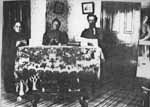
Arranged by:
Name
Address
Occupation
Birthplace
People of Color
Maps of Pullman
Images of the Town of Pullman
All images of the town
Vistas
Art & Architecture
- Landscape architect Nathan Franklin Barrett
- Architect Solon Spencer Beman
- Henry Koopman and Family, Photographer
- Landscape Design
Pullman’s Neighborhood
- The Calumet River
- IHACCR
- Area Churches
- The Kensington Neighborhood
- Lake Calumet
- North Pullman
- The Roseland Neighborhood
Buildings in Pullman
- The Arcade Building
- Arcade Park
- Carriage House
- Casino Building
- Fire Department
- Freight Depot
- Gas Works
- The Hotel Florence
- Hospital
- Houses
- Market Hall
- Schools
- Stable
- Train Station
Other Pullman-Related Sites
- Historic Pullman Garden Club - An all-volunteer group that are the current stewards of many of the public green spaces in Pullman. (http://www.hpgc.org/
- Historic Pullman Foundation - The HPF is a non-profit organization whose mission is to "facilitate the preservation and restoration of original structures within the Town of Pullman and to promote public awareness of the significance of Pullman as one of the nation's first planned industrial communities, now a designated City of Chicago, State of Illinois and National landmark district." (http://www.pullmanil.org/)
- The National A. Philip Randolph Pullman Porter Museum is a 501(c)3 cultural institution. Its purpose is to honor, preserving present and interpreting the legacy of A. Philip Randolph, Pullman Porters, the Brotherhood of Sleeping Car Porters and the contributions made by African-Americans to America's labor movement. ((http://www.nationalpullmanportermuseum.com/)
- Pullman Civic Organization - The PCO is a strong and vibrant Community Organization that has been in existence since 1960. (http://www.pullmancivic.org/)
- Pullman National Monument - The official page of the Pullman National Park. (https://www.nps.gov/pull/)
- South Suburban Genealogical & Historical Society - SSG&HS holds the Pullman Collection, consisting of personnel records from Pullman Car Works circa 1900-1949. There are approximately 200,000 individuals represented in the collection. (https://ssghs.org/)
- The Industrial Heritage Archives of Chicago's Calumet Region is an online museum of images that commemorates and celebrates the historic industries and workers of the region, made possible by a Library Services and Technology Act grant administered by the Illinois State Library. (http://www.pullman-museum.org/ihaccr/)
- Illinois Digital Archives (IDA) is a repository for the digital collections libraries and cultural institutions in the State of Illinois and the hosting service for the online images on this site. (http://www.idaillinois.org/)
